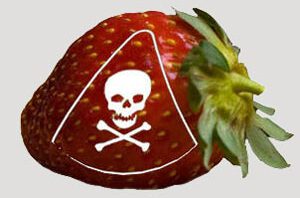FOR IMMEDIATE RELEASE
June 17, 2010
Contacts:
Kathryn Gilje, Pesticide Action Network North America,
Email: kathryn@panna.org, Cell: 415.235.9437
Paul Towers, Pesticide Watch,
Email: paul@pesticidewatch.org, Cell: 916.216.1082
Megan Buckingham, Californians for Pesticide Reform,
Email: megan@pesticidereform.org, Cell: 319-230-0282
Scientists testify to the dangers of methyl iodide while Californians demand public health over corporate interests
Sacramento, CA — Diverse representatives of progressive business, farmers, and advocates for health, justice, labor and the environment, will present Governor Schwarzenegger with comments and petitions today from tens of thousands of Californians demanding that methyl iodide—linked to long-term illnesses like cancer, miscarriages and brain damage—not be used as a pesticide in this state. The coalition urges Governor Arnold Schwarzenegger to prioritize public health over pesticide profits. “Over 27,000 CREDO Action members have submitted public comments in opposition to methyl iodide,” said Adam Klaus, Campaign Manager for CREDO. “This toxic chemical has no place poisoning our food or our farmworkers. The Department of Pesticide Regulation has a duty to stand up for Californians, not the big chemical and agribusiness companies.”
At 2 p.m., a Senate Food and Agriculture Committee hearing will feature members of California Department of Pesticide Regulation’s (DPR) own Scientific Review Committee on methyl iodide, including Dr. John Froines, Dr. Paul Blanc, Dr. Ted Slotkin, and Dr. Katherine Hammond. These eminent scientists were part of a panel of internationally respected experts who were commissioned by DPR to review the chemical. Despite the scientific evidence, their findings were essentially ignored in DPR’s April 30, 2010 proposal to register methyl iodide. The report released by the panel in February 2010 concluded that any agricultural use of the high toxicity pesticide, “…would result in exposures to a large number of the public and thus would have a significant adverse impact on the public health,” adding that, “adequate control of human exposure would be difficult, if not impossible.”
These scientists’ profound concerns echo a group of over 50 eminent scientists, including six Nobel Laureates, who sent a letter to U.S. EPA about methyl iodide. It stated, “…broad use of [methyl iodide] in agriculture will guarantee substantial releases to air, surface waters and groundwater, and will result in exposures for many people. In addition to the potential for increased cancer incidence, US EPA’s own evaluation of the chemical also indicates that methyl iodide causes thyroid toxicity, permanent neurological damage, and fetal losses in experimental animals.” The letter expresses the scientists’ astonishment that EPA would “legalize broadcast releases of one of the more toxic chemicals used in manufacturing into the environment.”
Dr. Susan Kegley, Consulting Scientist with Pesticide Action Network, said, “The Department of Pesticide Regulation has made a decision that a certain number of miscarriages caused by methyl iodide is acceptable. In the minds of Californians, no level of miscarriages or cancer or any other condition caused by methyl iodide is in any way acceptable.”
Since April 30, 2010, when DPR issued its proposed decision, California residents, farmworkers, consumers, and public health professionals have flooded the department with comments opposing registration—by far the largest number the department has ever received. Californians have made it clear to Governor Schwarzenegger they do not want the carcinogenic pesticide used in the state, and they hold his administration accountable for the decision.
The extent of the public response has engaged the attention of state legislators, some of who are now considering a proposal to help mitigate the health and economic costs of the proposed pesticide through the state budget.
The pesticide is manufactured by the largest privately owned pesticide company in the world, Arysta LifeScience, which has heavily lobbied the Governor and waged a communications campaign in California to secure registration in one of the most lucrative markets in the nation. “California farmers already successfully produce tens of millions of dollars worth of organic strawberries every year without chemicals like methyl iodide, giving the lie to Arysta’s assertions that the industry will collapse without this pesticide. The Governor must not ignore the voices of tens of thousands of Californians, who are outraged that industry profits appear to outweigh overwhelming scientific evidence damning this chemical,” said Megan Buckingham with Californians for Pesticide Reform.
Methyl iodide poses the most direct risk to workers in the field and nearby residents. “For the sake of farmworkers and their families, I hope that California doesn’t register methyl iodide,” said pesticide poisoning survivor Teresa DeAnda of Earlimart. “I know how frightening it can be when you suddenly start developing painful or disorienting symptoms, and you don’t know whether you’re going to be left permanently damaged and unable to care for your children.”
Sisquoc community resident, Deby DeWeese, lives at the edge of fields where methyl iodide would likely be used. “DPR says allowing use of methyl iodide will be fine because of the extra precautions they would require—better tarps, better protective gear, buffer zones around some areas,” she said. “But a buffer zone around our kids’ schools won’t protect them when we live so close to the fields, and even the hardiest tarps blow off. ”
California’s Department of Pesticide Regulation (DPR) proposed methyl iodide use on April 30, with a 60-day comment period expiring June 29. A news conference at the Capitol today preceded the presentation to the Governor’s office.
###
Available for Interviews:
Susan Kegley, PhD, Consulting Scientist, Pesticide Action Network North America. Cell: 510-759-9397.
Teresa DeAnda, Central Valley Coordinator, Californians for Pesticide Reform. Available for interviews in Spanish or English. Cell: 661-304-4080.
Paula Placencia, Assistant Coordinator, Central Coast, Líderes Campesinas Organización en California. Available exclusively at the Press Conference for interviews in Spanish.
Martha Guzman Aceves, Legislative Advocate, California Rural Legal Assistance Foundation. Cell: 916-524-2241
Karen Moyes, Resident of Sisquoc, CA. Home: 805-937-6520







